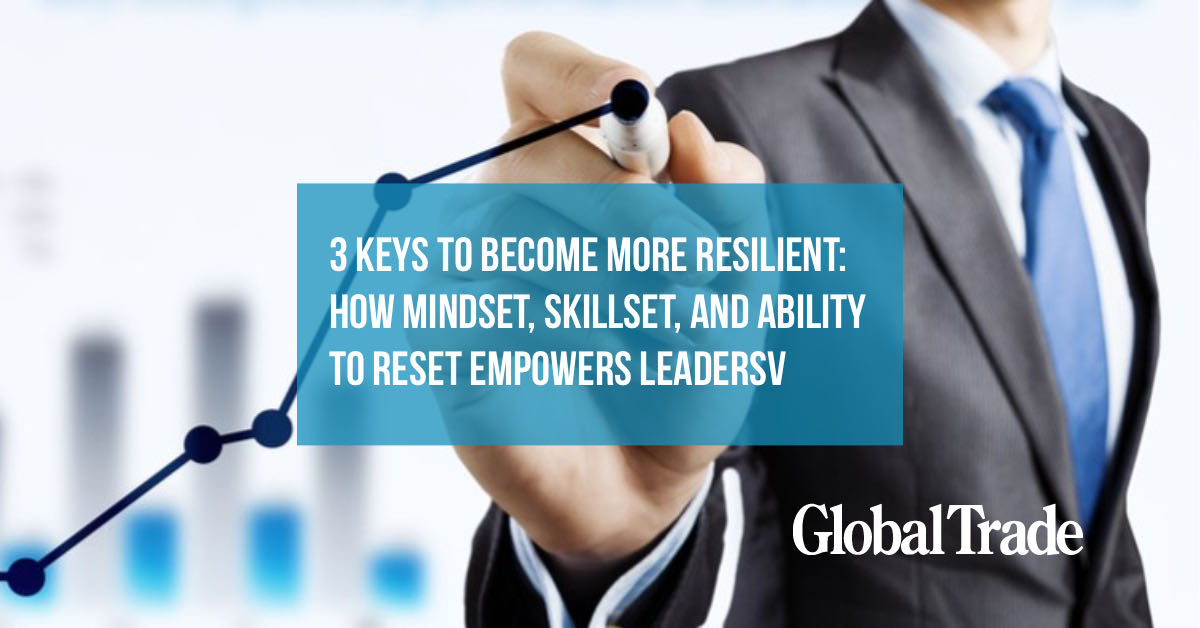3 Keys to Become More Resilient: How Mindset, Skillset, and Ability to Reset Empowers Leaders
This article, written by Anne, originally appeared on GlobalTrade.com
April 29, 2019
Building resilient organizations requires resilient leaders. Being resilient enables you to overcome setbacks, build effective teams, and stay focused on what really matters in your life and company.
Resilience is our ability to recover when we are faced with obstacles, difficulties, and setbacks. It allows you to tap into your strength and courage so you can persevere when things don’t go as you had planned.
Research finds that resilient people excel in problem solving, positive communication, emotional intelligence, and emotional regulation. They are also more hopeful and optimistic, and have higher levels of self-esteem. These are vital skills for leaders, both for their own health and happiness and to inspire their teams.
The people who work for you pay close attention to how you deal with challenges. Resilient leaders look at failures not as crushing defeats but as opportunities to grow and move forward. Resilience allows you to set a powerful, positive, effective example.
When I speak to groups, I sometimes begin by asking: “How many of you have survived the worst thing that has ever happened to you?” It’s a way of demonstrating that we are all, by our very nature, strong and resilient.
At the same time, resilience is not static. It is a set of habits, beliefs, and behaviors we can cultivate and practice proactively, so they are there when we need them. And whether we like it or not, life gives us plenty of opportunities to practice!
Fortunately, you don’t have to wait for a major setback or traumatic event to begin building your resilience. You can start today by focusing on three areas: your mindset, skillset, and your ability to reset:
Mindset includes your habits, emotional intelligence, and beliefs. Your mindset is the story you tell yourself about yourself, including how you think about stress. When we are under stress, the emotional center of our brain lights up, shooting the stress hormones cortisol and adrenaline through our brain and body. This was originally intended to help us freeze, run away, or fight an impending attacker; the same process happens when we face an emotional setback or threat. Your brain doesn’t know the difference between a real or perceived threat. When you identify how you respond to stress, you can begin to proactively manage it. The bottom line: Our beliefs drive behavior. And beliefs can be changed.
Skillset includes our ability to cultivate gratitude, optimism, and other positive emotions; to manage stress; to mitigate negative self-talk; and to engage in activities that are good for us like humor, social connection, mindfulness, and self-care. Some skills you can start practicing today include:
–Gratitude. Numerous scientific studies have shown that practicing being grateful on a regular basis lowers blood pressure, reduces inflammation, improves heart health and sleep, and lowers our levels of stress. People who practice gratitude have improved sleep, mood, decision-making, and relationships along with fewer aches, pains, and bouts of depression. The benefits are almost immediate. You don’t even have to find anything to be grateful for. The simple act of looking releases the feel-good neurochemicals serotonin and dopamine and lowers the stress hormone cortisol by 23%.
–Optimism also lowers cortisol and increases dopamine and serotonin. People who practice optimism have fewer aches and pains, along with better physical and mental health. It has also been linked with higher income and more successful relationships.
–Mindfulness is simply being where you are when you’re there. Mindfulness trains your mind to focus on the moment instead of worrying about what occurred in the past or what might happen in the future. This makes you less likely to hit the panic button, and reverses stress-related changes in the brain.
–Laughter is good for your soul and your brain. Studies show a genuine smile (one that involves facial muscles around the eyes) sparks a change in brain activity related to a good mood.
–Social connection is the greatest predictor of longevity. Surround yourself with people that lift you up, celebrate, and laugh with you.
Reset is getting out of being busy, being deliberate about where you invest your energy, and making sure that your actions are in line with your intentions in terms of your priorities. Taking the time to reset is imperative for leaders to keep their focus on what matters most. For instance, it can help you identify your high-payoff activities.
A high-payoff activity is an activity that brings the greatest result for the time invested. Twenty percent of the tasks that we do on any given day generate 80 percent of our results. By identifying the tasks and responsibilities that bring the greatest return for time invested, you can focus on planning and prioritizing these activities.
What do you wish you had more time for? Where is it scheduled in your calendar? If you tracked your time would it be representative of what you say is most important to you? Take the time to make sure your actions match your intentions. It’s all about focusing on what’s important.

Anne Grady is a Speaker, Author, and #TruthBomb Dropper.
Anne shares practical strategies that can be applied both personally and professionally to improve relationships, navigate change, and triumph over adversity. And she’ll make you laugh while she does it. Anne is a two time TEDx speaker, and her work has been featured in numerous media outlets, including Harvard Business Review, Entrepreneur, Forbes, Fast Company and Inc. magazines, CNN, ESPN, and FOX Business. She is the best selling author of 52 Strategies for Life, Love & Work and Strong Enough: Choosing Courage, Resilience and Triumph.

